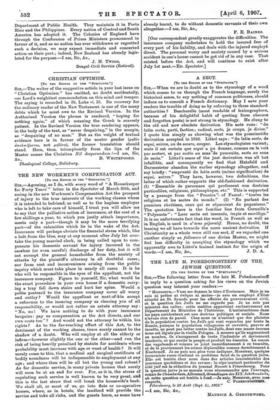A SECT.
[To Ts. EDITOR Or THE “Sresuree."]
Sin,—When we are in doubt as to the etymology of a word which comes to us through the French language, surely the historical sense, to say nothing of common politeness, should induce us to consult a French dictionary. May I save your readers the trouble of doing so by referring to three standard authorities ? Bescherelle (most readable of lexicographers, because of his delightful habit of quoting from obscure and forgotten poets) is not strong in etymology. He clung to the old and now obsolete derivation. His note runs : "du latin secta, parti, faction; radical, secto, je coupe, je divine." I quote him simply as showing what was the prescientific derivation accepted in 1856. Littre says : "du latin sesta, de sequi, snivre, ou de secare, couper. Les etymologistes varient; mais it est certain que sequi a pn dormer, comme on he volt par sectari, et par sectio au sans'do poursuite, sesta an sena de secte." Littre's sense of the just derivation was all but infallible, and consequently we find that Hatzfeld and Darmesteter abandon the earlier etymology altogether, and say briefly: "emprunte du latin sesta (memo signification) de sepal, suivre." They have, however, two definitions, the latter of which rather supports the old-fashioned derivation. (1) "Ensemble de personnes qui professent une doctrine particuliere, religieuse, philosophique, etc." This is supported by a passage from the " Pensies". of Pascal : "tontes lea religions et lea sectes du monde." (2) "En parlant des premiers chretiens, ceux qui se separaient du paganisme." The quotation here is the familiar line from Corneille's " Polyeucte" : " Lenr sects est insensee, impie et sacrilege." It is an unfortunate fact that the word, in French as well as in English, is used in a' seas pejoratif. Hence, no doubt, the leaning we all have towards the more ancient derivation. If Christianity as a whole were still one sect, if we regarded one another simply as followers of one divine Master, we might feel less difficulty in accepting the etymology which we apparently owe to Littre's trained instinct for the origin of










































 Previous page
Previous page